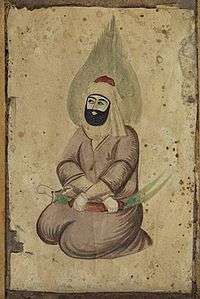Aleviler
For other uses, see Alawi (disambiguation).
For the mainly Syrian-Shi’ite religious group, see Alawis. For the mainly Non-Muslim Kurdish religious groups, see Yazdânism.
| |
|---|
 |
|
|
Aleviler is an idiom to characterize the Zaydids of Tabaristan, Daylam and Gilan; the Bātinī-Ismāʿīlīs[1] of Pamir Mountains in Turkestan and the Non-Ja'fari Twelver-Shi’ites in Turkey.
Classification of Aleviler
- Turkestan Alevis[1]
- Zaid’īyyah Alavids of the Tabaristan, Daylam and Gilan, emerged under the influence of the Hasan ibn Zayd and the efforts of Hasan ibn Ali al-Utrush
- Bātinī-Ismāʿīl’īyyah Alevis of the Pamir Mountains,[1] emerged under the influence of the Ismailyya Da'i Nasir Khusraw al-Qubadiani of the Fatimid caliph Abū Tamīm Ma'add al-Mustanṣir bi-llāh
- Bābā’ī-Bātin’īyyah (Mostly Turkish and some Kurdish) Alevis
- Ḥurūfī’īyyah-Bektashism/Bektashiyyah Tariqa, a religious Alevi-Bātinī community in Turkey, Balkans and Albania, emerged under the influence of Ismailiyyah Shia, Shamanism and Tengrism
- Sāfav’īyyah-Kızılbaşism/Qizilbash Tariqa, a religious Ghulāt-Alevi community in Turkey, emerged under the influence of Kaysanites Shia, Khurramiyyah Tariqa, and Shah Ismail of the Safavid Dynasty in Iran
- Non-Islamic Yazdânī Faith [2] (Claimed by some of their followers as Kurdish Alevism,[3] as well)
References
- 1 2 3 Balcıoğlu, Tahir Harimî, Türk Tarihinde Mezhep Cereyanları - The course of madh'hab events in Turkish history (Preface and notes by Hilmi Ziya Ülken), Ahmet Sait Press, 271 pages, Kanaat Publications, Istanbul, 1940. (Turkish)
- ↑ Izady, Mehrdad R. (1992), The Kurds : a concise handbook, Washington & London: Taylor & Francis, pp. 170 passim, ISBN 0-8448-1727-9
- ↑ Persian: اهل حق Ahl-e Haqq "People of Truth"), is a syncretic religion founded by Sultan Sahak in the late 14th century in western Iran.
- ↑ Hamzeh'ee, M. Reza Fariborz (1995). Krisztina Kehl-Bodrogi; et al., eds. Syncretistic Religious Communities in the Near East. Leiden: Brill. pp. 101–117. ISBN 90-04-10861-0.
- ↑ P. G. Kreyenbroek (1992). Review of The Yaresan: A Sociological, Historical and Religio-Historical Study of a Kurdish Community, by M. Reza Hamzeh'ee, 1990, ISBN 3-922968-83-X. Bulletin of the School of Oriental and African Studies, University of London, Vol.55, No.3, pp.565-566.
- ↑ Elahi, Bahram (1987). The path of perfection, the spiritual teachings of Master Nur Ali Elahi. ISBN 0-7126-0200-3.
- ↑ Bulut, Faik. (2011), "Ali'siz Alevîlik" - Alevism without Ali, Berfin Yayıncılık.
- ↑ Erdoğan Çınar (2004). "Aleviliğin Gizli Tarihi - (The Secret history of Alevism)". Chivi Yazıları. (http://www.idefix.com).
| |||
|---|---|---|---|
| The Fourteen Infallibles | |||
|
|||
| Principles | |||
| Other beliefs | |||
| Practices | |||
| Holy cities | |||
| Groups | |||
|
|
|||
| Scholarship | |||
| Hadith collections | |||
| Related topics | |||
| Related portals | |||
|
|||
Further reading
Alavids
- Madelung, W. (1975). "The Minor Dynasties of Northern Iran". In Frye, R.N. The Cambridge History of Iran, Volume 4: From the Arab Invasion to the Saljuqs. Cambridge: Cambridge University Press. pp. 198–249. ISBN 978-0-521-20093-6.
- Madelung, W. (1985). "ʿALIDS OF ṬABARESTĀN, DAYLAMĀN, AND GĪLĀN". Encyclopaedia Iranica, Vol. I, Fasc. 8. London u.a.: Routledge & Kegan Paul. pp. 881–886. ISBN 0710090994.
Further information: Alavids and History of Tabaristan
Bektashism
- Brown, John (1927), The Darvishes of Oriental Spiritualism.
- Küçük, Hülya (2002) The Roles of the Bektashis in Turkey’s National Struggle. Leiden: Brill.
- Mélikoff, Irène (1998). Hadji Bektach: Un mythe et ses avatars. Genèse et évolution du soufisme populaire en Turquie. Leiden: Islamic History and Civilization, Studies and Texts, volume 20, ISBN 90-04-10954-4.
- Vorhoff, Karin. (1998), “Academic and Journalistic Publications on the Alevi and Bektashi of Turkey.” In: Tord Olsson/Elizabeth Özdalga/Catharina Raudvere (eds.) Alevi Identity: Cultural, Religious and Social Perspectives, Istanbul: Swedish Research Institute, pp. 23–50.
- Yaman, Ali & Aykan Erdemir (2006). Alevism-Bektashism: A Brief Introduction, London: England Alevi Cultural Centre & Cem Evi. ISBN 975-98065-3-3
Further information: Bektashism and folk religion and Bektashiyyah
Kızılbaşism
- Halm, H. (1982). Die Islamische Gnosis: Die extreme Schia und die Alawiten. Zurich.
- Kehl-Bodrogi, Krisztina (1992). Die Kizilbas/Aleviten. Untersuchungen uber eine esoterische Glaubensgemeinschaft in Anatolien. Die Welt des Islams, (New Series), Vol. 32, No. 1.
- Krisztina Kehl-Bodrogi, Krisztina, & Barbara Kellner-Heinkele, Anke Otter-Beaujean, eds. (1997) Syncretistic Religious Communities in the Near East. Leiden: Brill, pp. 11–18.
- Moosa, Matti (1988). Extremist Shiites: The Ghulat Sects, Syracuse University Press.
Further information: Safavid conversion of Iran to Shia Islam and Qizilbash
Ahl-e Haqq Tariqa and Kurdish Alevis
- Elahi, Bahram (1987). The path of perfection, the spiritual teachings of Master Nur Ali Elahi. ISBN 0-7126-0200-3.
- Encyclopedia of the Modern Middle East and North Africa (Detroit: Thompson Gale, 2004) p. 82.
- Edmonds, Cecil (1957). Kurds, Turks, and Arabs: politics, travel, and research in north-eastern Iraq, 1919-1925. Oxford University Press.
- Hamzeh'ee, M. Reza Fariborz (1995). Krisztina Kehl-Bodrogi; et al., eds. Syncretistic Religious Communities in the Near East. Leiden: Brill. pp. 101–117. ISBN 90-04-10861-0.
- Kreyenbroek, P. G. (1992). Review of The Yaresan: A Sociological, Historical and Religio-Historical Study of a Kurdish Community, by M. Reza Hamzeh'ee, 1990, ISBN 3-922968-83-X. Bulletin of the School of Oriental and African Studies, University of London, Vol.55, No.3, pp. 565–566.
- White, Paul J. (2003), “The Debate on the Identity of "Alevi Kurds".” In: Paul J. White/Joost Jongerden (eds.) Turkey’s Alevi Enigma: A Comprehensive Overview. Leiden: Brill, pp. 17–32.
Further information: Ahl-e Haqq, Sultan Sahak, Hajj Nematollah, Nur Ali Elahi, Ali-Illahism, Chinarism, and Esoterism
This article is issued from Wikipedia - version of the 10/16/2016. The text is available under the Creative Commons Attribution/Share Alike but additional terms may apply for the media files.

